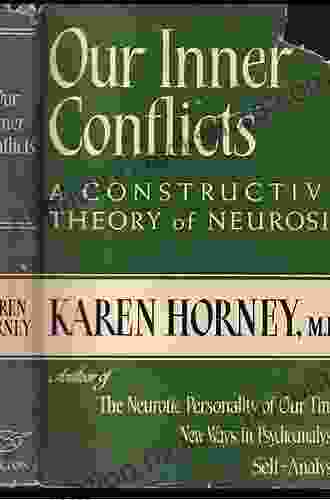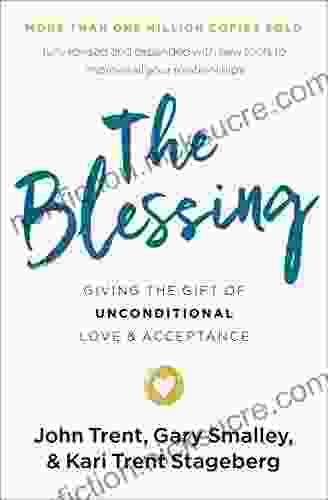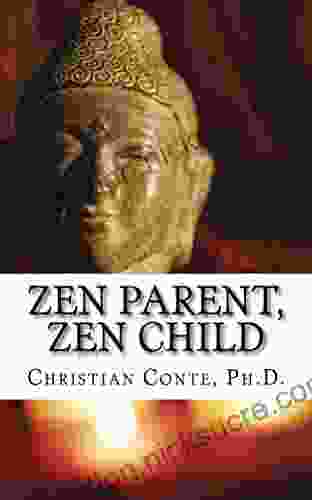Our Inner Conflicts: A Constructive Theory of Neurosis

We all experience inner conflict from time to time. It's a natural part of the human experience. But what happens when these conflicts become so intense that they start to interfere with our lives?
4.7 out of 5
| Language | : | English |
| File size | : | 1098 KB |
| Text-to-Speech | : | Enabled |
| Screen Reader | : | Supported |
| Enhanced typesetting | : | Enabled |
| Word Wise | : | Enabled |
| Print length | : | 254 pages |
Traditional psychoanalysis has often viewed inner conflict as a sign of pathology. According to this view, neurosis is caused by unresolved conflicts from childhood. These conflicts are said to be repressed into the unconscious mind, where they continue to wreak havoc on our lives.
However, a more recent theory of neurosis suggests that our inner conflicts are not necessarily pathological. In fact, they can be a source of growth and creativity. This theory is known as the constructive theory of neurosis.
The constructive theory of neurosis was developed by the psychoanalyst Karen Horney. Horney believed that neurosis is not caused by unresolved conflicts from childhood, but rather by the way we relate to ourselves and others. She argued that we all have a basic need for love and acceptance. However, when this need is not met, we develop neurotic defenses to protect ourselves from feeling unloved and unwanted.
These neurotic defenses can take many forms, such as:
- Aggression: We may become aggressive towards others in order to feel powerful and in control.
- Withdrawal: We may withdraw from social situations in order to avoid feeling rejected.
- Submission: We may become overly submissive to others in order to gain their approval.
While these defenses may provide us with temporary relief from our inner conflicts, they ultimately prevent us from living full and satisfying lives. The constructive theory of neurosis suggests that the key to overcoming neurosis is to become aware of our neurotic defenses and to learn to relate to ourselves and others in a more healthy way.
Benefits of Inner Conflict
While inner conflict can be challenging, it can also be a source of growth and creativity. Here are some of the benefits of inner conflict:
- It can help us to identify our values and priorities. When we are faced with a difficult decision, we are forced to examine our values and priorities in order to make a choice. This can help us to become more aware of who we are and what we want out of life.
- It can help us to develop new coping mechanisms. When we are faced with a challenge, we are forced to find new ways to cope. This can help us to develop new skills and strategies that we can use to overcome future challenges.
- It can help us to grow and change. Inner conflict can be a catalyst for growth and change. When we are challenged, we are forced to grow and change in order to overcome the challenge.
How to Cope with Inner Conflict
If you are struggling with inner conflict, there are a few things you can do to cope:
- Identify your triggers. What situations or people tend to trigger your inner conflict? Once you know what your triggers are, you can start to avoid them or develop strategies for dealing with them.
- Challenge your negative thoughts. When you find yourself having negative thoughts, challenge them. Ask yourself if there is any evidence to support your thoughts. Are you really as worthless as you think you are? Are you really going to fail?
- Practice self-care. When you are feeling stressed or overwhelmed, it is important to practice self-care. This means taking care of your physical and mental health. Get enough sleep, eat healthy foods, and exercise regularly.
- Seek professional help. If you are struggling to cope with inner conflict on your own, seek professional help. A therapist can help you to identify the root of your conflict and develop strategies for coping with it.
Inner conflict is a natural part of the human experience. It can be challenging, but it can also be a source of growth and creativity. By understanding the constructive theory of neurosis, we can learn to cope with our inner conflicts in a healthy way and use them to our advantage.
4.7 out of 5
| Language | : | English |
| File size | : | 1098 KB |
| Text-to-Speech | : | Enabled |
| Screen Reader | : | Supported |
| Enhanced typesetting | : | Enabled |
| Word Wise | : | Enabled |
| Print length | : | 254 pages |
Do you want to contribute by writing guest posts on this blog?
Please contact us and send us a resume of previous articles that you have written.
 Fiction
Fiction Non Fiction
Non Fiction Romance
Romance Mystery
Mystery Thriller
Thriller SciFi
SciFi Fantasy
Fantasy Horror
Horror Biography
Biography Selfhelp
Selfhelp Business
Business History
History Classics
Classics Poetry
Poetry Childrens
Childrens Young Adult
Young Adult Educational
Educational Cooking
Cooking Travel
Travel Lifestyle
Lifestyle Spirituality
Spirituality Health
Health Fitness
Fitness Technology
Technology Science
Science Arts
Arts Crafts
Crafts DIY
DIY Gardening
Gardening Petcare
Petcare Brother Nero
Brother Nero Charlie Walker
Charlie Walker Susan Campbell Bartoletti
Susan Campbell Bartoletti Jim Al Khalili
Jim Al Khalili Bill Douglas
Bill Douglas Frank Close
Frank Close Jason Frye
Jason Frye Richard Wiseman
Richard Wiseman Sam Chenery Morris
Sam Chenery Morris Debbie M Schell
Debbie M Schell Greg Wyshynski
Greg Wyshynski Patrick Sweeney
Patrick Sweeney Felix Eshesimua
Felix Eshesimua Chris Fitch
Chris Fitch Lester Kaufman
Lester Kaufman Tamara Ferguson
Tamara Ferguson Glenn Doman
Glenn Doman Simone Abram
Simone Abram Helen Barry Siragusa
Helen Barry Siragusa Zoe Mckey
Zoe Mckey David A Clark
David A Clark Richard E Silverman
Richard E Silverman J Bruce Brackenridge
J Bruce Brackenridge Klaus Dodds
Klaus Dodds Yuri Ulengov
Yuri Ulengov Natalie C Parker
Natalie C Parker Daniel S Newman
Daniel S Newman Stefanie Weisman
Stefanie Weisman Sjaak Laan
Sjaak Laan Roald Amundsen
Roald Amundsen Robert Macfarlane
Robert Macfarlane Dr Sandeep Jatwa
Dr Sandeep Jatwa Delaney Ruston
Delaney Ruston John R Weisz
John R Weisz Lane Rebelo
Lane Rebelo Kaplan Test Prep
Kaplan Test Prep Karl Polanyi
Karl Polanyi Jessica Lander
Jessica Lander Sig Hansen
Sig Hansen Theron Hopkins
Theron Hopkins Creek Stewart
Creek Stewart Miles Howard
Miles Howard Mindy Mcginnis
Mindy Mcginnis Marlene Laruelle
Marlene Laruelle Jennifer M Sparks
Jennifer M Sparks Ryan Robert
Ryan Robert Stephanie Dueger
Stephanie Dueger Steve Brill
Steve Brill Jay Mccullough
Jay Mccullough Susan K Grove
Susan K Grove Jonathan Wolf
Jonathan Wolf David J Hand
David J Hand Georg Rauch
Georg Rauch Daniel Loxton
Daniel Loxton Harry Bruinius
Harry Bruinius Maria Del Russo
Maria Del Russo Tommy Hicks
Tommy Hicks Les Stroud
Les Stroud Dave Wilson
Dave Wilson Shauna L Shapiro
Shauna L Shapiro Tina Basich
Tina Basich Jay Hoffman
Jay Hoffman Mike Kephart
Mike Kephart Charmaine Mckissock
Charmaine Mckissock Marie Mance
Marie Mance Michael Lempert
Michael Lempert Len Mcdougall
Len Mcdougall Christophe Morin
Christophe Morin Martin W Ball
Martin W Ball Jaime Aron
Jaime Aron Keely Hutton
Keely Hutton Lisa Gache
Lisa Gache J Franklin Snyder
J Franklin Snyder Lefty Kreh
Lefty Kreh Lee A Wilkinson
Lee A Wilkinson Marie Viljoen
Marie Viljoen National Fastpitch Coaches Association
National Fastpitch Coaches Association Richard A Horsley
Richard A Horsley Mark Golds
Mark Golds Esther M Toddler
Esther M Toddler Patricia Burroughs
Patricia Burroughs Elizabeth Swire Falker
Elizabeth Swire Falker Chris Donaldson
Chris Donaldson Jeff Henigson
Jeff Henigson Craig Pittman
Craig Pittman Warren Ellis
Warren Ellis Haylie Duff
Haylie Duff Jane Bottomley
Jane Bottomley Michael Whitehead
Michael Whitehead Ronald Wright
Ronald Wright Leland Chant
Leland Chant Christian Bates
Christian Bates Joan Naidorf
Joan Naidorf Sport Hour
Sport Hour Stuart A Klugman
Stuart A Klugman Christopher Scott
Christopher Scott Delia Owens
Delia Owens Misty Jordyn
Misty Jordyn Penny Simkin
Penny Simkin John Volanthen
John Volanthen Konstantinos Mylonas
Konstantinos Mylonas Peter Canning
Peter Canning Richard Louv
Richard Louv Havilah Babcock
Havilah Babcock Bob Bell
Bob Bell Jeffrey John Kripal
Jeffrey John Kripal Thomas C Foster
Thomas C Foster Evy Poumpouras
Evy Poumpouras Gish Jen
Gish Jen Elizabeth Fein
Elizabeth Fein Quick Reads
Quick Reads Ethan Bezos
Ethan Bezos Kati Kleber
Kati Kleber Genie Reads
Genie Reads Jenna Helland
Jenna Helland Duncan Wells
Duncan Wells Jennifer Mind
Jennifer Mind Stephen Brennan
Stephen Brennan Ken Palmer
Ken Palmer Kevin Estela
Kevin Estela David J Cox
David J Cox Cgp Books
Cgp Books W H C Bassetti
W H C Bassetti Joseph A Mccullough
Joseph A Mccullough Lina Chang
Lina Chang Dominic O Brien
Dominic O Brien Laura Sebastian
Laura Sebastian Sammy Franco
Sammy Franco Mary Catherine Bateson
Mary Catherine Bateson Hakim Isler
Hakim Isler Dave Canterbury
Dave Canterbury Christopher Heaney
Christopher Heaney Dahlia Adler
Dahlia Adler Sarah Bennett
Sarah Bennett Dan Reeder
Dan Reeder Dave King
Dave King Chris Gosden
Chris Gosden Sam Jarman
Sam Jarman Howard Markel
Howard Markel William Wasserman
William Wasserman Rough Guides
Rough Guides Theodore Gray
Theodore Gray John Allen
John Allen Chris Riddell
Chris Riddell Christine H Morton
Christine H Morton Laurie Seale
Laurie Seale Anya Hayes
Anya Hayes Nathan Fox
Nathan Fox Tracy Donegan
Tracy Donegan John Weir
John Weir Matt Lewis
Matt Lewis Margalis Fjelstad
Margalis Fjelstad Viviana Gyori
Viviana Gyori R A Palmer
R A Palmer Louise Greenspan
Louise Greenspan Paul Carus
Paul Carus Tara Isabella Burton
Tara Isabella Burton Mike Swedenberg
Mike Swedenberg Julia Miele Rodas
Julia Miele Rodas The Princeton Review
The Princeton Review Chrissie Wellington
Chrissie Wellington P C Cast
P C Cast Scott Lanning
Scott Lanning Brock Eide
Brock Eide Bill Patton
Bill Patton Creative Task
Creative Task Reid Henrichs
Reid Henrichs Frederick Courteney Selous
Frederick Courteney Selous Rachel Simmons
Rachel Simmons Marie Louise
Marie Louise Ken Setterington
Ken Setterington J Phillip Stonewater
J Phillip Stonewater James Morgan Ayres
James Morgan Ayres Cora Rivers
Cora Rivers Kenny Dill
Kenny Dill Rachel Morgan
Rachel Morgan Chris Mccormack
Chris Mccormack Mariamelys Yanez
Mariamelys Yanez King Heiple
King Heiple Lynette Noni
Lynette Noni Jack Burns
Jack Burns Ian Wilson
Ian Wilson Trevelyan
Trevelyan Nick Fragel
Nick Fragel Glinda Porter
Glinda Porter Maryse Cardin
Maryse Cardin John C Gordon
John C Gordon Nathan Holder
Nathan Holder Emma Griffin
Emma Griffin Cheryl Kimball
Cheryl Kimball David Miller
David Miller John T Moore
John T Moore Tricia Levenseller
Tricia Levenseller Karla Marie Williams
Karla Marie Williams Marlo Gottfurcht Longstreet
Marlo Gottfurcht Longstreet Robin Donovan
Robin Donovan Kate Pankhurst
Kate Pankhurst Catherine Carrigan
Catherine Carrigan Richard Bronson
Richard Bronson Grant Cunningham
Grant Cunningham Pam Coburn
Pam Coburn Paul Bellow
Paul Bellow Cecil Harris
Cecil Harris Heather A Smith
Heather A Smith Daniel Lenihan
Daniel Lenihan James F Clapp
James F Clapp Martin E P Seligman
Martin E P Seligman Paul Nash
Paul Nash David Baldacci
David Baldacci Suzanne Young
Suzanne Young Christopher Barile
Christopher Barile Warrior Primal
Warrior Primal Kevin C Kelleher Md Md
Kevin C Kelleher Md Md Katy Madison
Katy Madison Sean Fister
Sean Fister Jim Cobb
Jim Cobb Ennki Hakari
Ennki Hakari Henry Hatcher
Henry Hatcher Ronojoy Sen
Ronojoy Sen Erika Stalder
Erika Stalder Tania Israel
Tania Israel Paula Derr
Paula Derr Glen Heggstad
Glen Heggstad Patrick Schulte
Patrick Schulte Chris Jake
Chris Jake Rob Neyer
Rob Neyer Ronni Lundy
Ronni Lundy Martina Sprague
Martina Sprague John Galeano
John Galeano John Mccollister
John Mccollister Thomas Daniels
Thomas Daniels Sandy Gingras
Sandy Gingras Kevin Neary
Kevin Neary Nitin Guptta
Nitin Guptta Jim Parks
Jim Parks Frank Runles
Frank Runles Celeste Shally
Celeste Shally Johnjoe Mcfadden
Johnjoe Mcfadden Nicole Galan
Nicole Galan G Bruce Knecht
G Bruce Knecht Judy Bartkowiak
Judy Bartkowiak Lindsay Helm
Lindsay Helm Elizabeth Grosz
Elizabeth Grosz Dan Buettner
Dan Buettner Victoria E Kress
Victoria E Kress Tim Harford
Tim Harford S L Watson
S L Watson Erika Buenaflor M A J D
Erika Buenaflor M A J D Curtis Retherford
Curtis Retherford Marsha Vanwynsberghe
Marsha Vanwynsberghe Mark Hansen
Mark Hansen Hwei P Hsu
Hwei P Hsu Tony J Bell
Tony J Bell Jon Emmett
Jon Emmett Jeff Carreira
Jeff Carreira Arrl Inc
Arrl Inc Rebecca Rather
Rebecca Rather Heather Jacobson
Heather Jacobson Michael J Bennett
Michael J Bennett Dodie Smith
Dodie Smith Dr Robert Demaria
Dr Robert Demaria Danielle Paige
Danielle Paige Trevor Thomas
Trevor Thomas Patrick Linsenmeyer
Patrick Linsenmeyer Chris Crutcher
Chris Crutcher Patrick Garbin
Patrick Garbin Kindle Edition
Kindle Edition Dk
Dk Louis Turjanen
Louis Turjanen Todd Eklof
Todd Eklof Lawrence Schiller
Lawrence Schiller Cory Mccartney
Cory Mccartney David L Vance
David L Vance Dale H Schunk
Dale H Schunk Johannes W Rohen
Johannes W Rohen Mark Hatala
Mark Hatala Sonja Renee
Sonja Renee Sophie Delaplaine
Sophie Delaplaine Hal Herzog
Hal Herzog Randall Bell
Randall Bell Dina Rudick
Dina Rudick Karen Horney
Karen Horney Tessa Broad
Tessa Broad Patrick Vinton Kirch
Patrick Vinton Kirch Kat Howard
Kat Howard June Alexander
June Alexander Thomas Norman Dewolf
Thomas Norman Dewolf Clair Lasater
Clair Lasater Pavla Kesslerova
Pavla Kesslerova Jay Walden
Jay Walden Joshua Berman
Joshua Berman Joanna Pruess
Joanna Pruess Scott O Morton
Scott O Morton Samaire Wynne
Samaire Wynne Isle Osaki
Isle Osaki James Rushforth
James Rushforth Denise Wiesner
Denise Wiesner Michelle D Swaney
Michelle D Swaney Jennifer Ward
Jennifer Ward Matt Brown
Matt Brown Stephanie Clarke
Stephanie Clarke Randy Smith
Randy Smith Stephanie Greer
Stephanie Greer Michael Digiacomo
Michael Digiacomo Nancy Carter Crump
Nancy Carter Crump Donna R Causey
Donna R Causey Maggie Oakes
Maggie Oakes Phil Dunmeyer
Phil Dunmeyer Russ Harris
Russ Harris John H Hanson
John H Hanson Daniel Holzman
Daniel Holzman Kevin Muramatsu
Kevin Muramatsu Edward Bulwer Lytton
Edward Bulwer Lytton Susan Brink
Susan Brink Dennis Fisher
Dennis Fisher Stephen R Bown
Stephen R Bown Irene Mchenry
Irene Mchenry Jon Sherman
Jon Sherman Richard S Westfall
Richard S Westfall Doc Severson
Doc Severson Grace Mccready
Grace Mccready Nelson Simon
Nelson Simon Greg Stucky
Greg Stucky Stella Cottrell
Stella Cottrell Joel Greenberg
Joel Greenberg Quad Webb
Quad Webb Paddy Dillon
Paddy Dillon Melinda Tankard Reist
Melinda Tankard Reist Dermot Moran
Dermot Moran Mark Bacera
Mark Bacera Kaiser Fung
Kaiser Fung Samuel T Heart
Samuel T Heart Mohamed F El Hewie
Mohamed F El Hewie Doug Gaskill
Doug Gaskill John Flanagan
John Flanagan Scott H Sicherer
Scott H Sicherer Rachel Dickinson
Rachel Dickinson Kevin Dutton
Kevin Dutton Larry Flax
Larry Flax Megan Miller
Megan Miller Conrad Fischer
Conrad Fischer Drew Clifton
Drew Clifton Stephen J Bavolek
Stephen J Bavolek Iman Hami
Iman Hami Jacqueline Melvin
Jacqueline Melvin Kathryn Harkup
Kathryn Harkup Denise Alvarado
Denise Alvarado Keith Ryan Cartwright
Keith Ryan Cartwright Kenneth Rideout
Kenneth Rideout Dr Rex S Vanderwood
Dr Rex S Vanderwood Paul Farmer
Paul Farmer Jen L Grey
Jen L Grey Kristin Cashore
Kristin Cashore Patrice Karst
Patrice Karst Robin Hanson
Robin Hanson Nico Medina
Nico Medina Schuld
Schuld Peter Owen
Peter Owen Mike Schultz
Mike Schultz Jonathan Beverly
Jonathan Beverly Michael Paduch
Michael Paduch Larry Olmsted
Larry Olmsted Stefanie Reinhold
Stefanie Reinhold Robin Dunbar
Robin Dunbar Robert W Sussman
Robert W Sussman Shelly Crane
Shelly Crane Margot De Sevo
Margot De Sevo Nicholas Sparks
Nicholas Sparks Darren Levine
Darren Levine Clifford Geertz
Clifford Geertz Michelle Cree
Michelle Cree Vassos Alexander
Vassos Alexander Joanna Grace
Joanna Grace Harry K Mcevoy
Harry K Mcevoy Jason Reynolds
Jason Reynolds Jennifer Kolari
Jennifer Kolari Hal Roth
Hal Roth Zara Fagen
Zara Fagen John Hoskison
John Hoskison Dave Bergman
Dave Bergman Baz Thompson
Baz Thompson Kahlil Gibran
Kahlil Gibran Sir John Franklin
Sir John Franklin Ron Kaspriske
Ron Kaspriske Henry E Mejia
Henry E Mejia Ryan Skinner
Ryan Skinner Dr Amanda Kemp
Dr Amanda Kemp Patrick Mcallister
Patrick Mcallister Jenny Han
Jenny Han Jessica Beck
Jessica Beck Anton Szandor Lavey
Anton Szandor Lavey Don Casey
Don Casey Lewis Hyde
Lewis Hyde Sabaa Tahir
Sabaa Tahir Becky Kopitzke
Becky Kopitzke Robert F Moss
Robert F Moss Clara Dehlin
Clara Dehlin James Stewart
James Stewart Gareth Thomas
Gareth Thomas Nick Muxlow
Nick Muxlow Christopher Pike
Christopher Pike Sean Herman
Sean Herman Jasper Kent
Jasper Kent Johannes Krause
Johannes Krause Mike White
Mike White Kailyn Lowry
Kailyn Lowry Rui Zhi Dong
Rui Zhi Dong Theodora Papatheodorou
Theodora Papatheodorou Johann Weyer
Johann Weyer Albert Gallatin Mackey
Albert Gallatin Mackey Arthur Hsieh
Arthur Hsieh Don J Snyder
Don J Snyder David Grant Noble
David Grant Noble Marlo Payne Thurman
Marlo Payne Thurman Charlie Francis
Charlie Francis Nancy Cartwright
Nancy Cartwright Jules Verne
Jules Verne Sarah Zettel
Sarah Zettel Peter Townsend
Peter Townsend Katie Schnack
Katie Schnack Elsevier
Elsevier Dawn M Mcbride
Dawn M Mcbride Tahir Shah
Tahir Shah Reemus Boxing
Reemus Boxing Rachel Swaby
Rachel Swaby Chloe Howard
Chloe Howard Jens Meyer
Jens Meyer Richard Berry
Richard Berry Asato Asato
Asato Asato Sara Woods
Sara Woods Christiane F
Christiane F Elizabeth Noble
Elizabeth Noble Naomi Shihab Nye
Naomi Shihab Nye Ronald Williams
Ronald Williams Michael Medved
Michael Medved Christopher Clarey
Christopher Clarey N J Enfield
N J Enfield John E Phillips
John E Phillips Dan Flores
Dan Flores John Trent
John Trent Liz Arch
Liz Arch Print Replica Kindle Edition
Print Replica Kindle Edition Katlin Middleton
Katlin Middleton Keith Gave
Keith Gave Randall Hicks
Randall Hicks Simon Monk
Simon Monk Christopher Ives
Christopher Ives John Schwartz
John Schwartz Summary Genie
Summary Genie Peter Koning
Peter Koning Ross Bentley
Ross Bentley Ron Maly
Ron Maly Terence Mclaughlin
Terence Mclaughlin Suzy Favor Hamilton
Suzy Favor Hamilton Michael J Leahy
Michael J Leahy Steven D Fleming
Steven D Fleming Nancy Northcott
Nancy Northcott Michael Blackburn
Michael Blackburn Stephanie Evans
Stephanie Evans Grant Andrews
Grant Andrews James O Aldrich
James O Aldrich S Meloni M D
S Meloni M D Law School Admission Council
Law School Admission Council Steve Jamison
Steve Jamison Amanda Phillips
Amanda Phillips Team Golfwell
Team Golfwell Nancy K O Leary
Nancy K O Leary Kevan Harris
Kevan Harris Rowan Blanchard
Rowan Blanchard Kay Gill
Kay Gill Amanda Sterczyk
Amanda Sterczyk Blake Dresden
Blake Dresden Peterson S
Peterson S Cliff Harris
Cliff Harris Cindy Ross
Cindy Ross Nicole Conway
Nicole Conway Jessica Ashley
Jessica Ashley Mantak Chia
Mantak Chia Jo A Kaucher
Jo A Kaucher Michael Plymel
Michael Plymel Jane Watkins
Jane Watkins Sally M Foster
Sally M Foster David Goudsward
David Goudsward Patrick M Browning
Patrick M Browning Lynn Melnick
Lynn Melnick Sydney George Fisher
Sydney George Fisher Rachel Griffin
Rachel Griffin Bill Fawcett
Bill Fawcett Steve Hagen
Steve Hagen Catherine Legrand
Catherine Legrand Stuart Mcrobert
Stuart Mcrobert Alejandro Sequera
Alejandro Sequera Michael Banton
Michael Banton Wendell Berry
Wendell Berry Booksumo Press
Booksumo Press William H Shellenberger
William H Shellenberger Tim Cammisa
Tim Cammisa Jacques Steinberg
Jacques Steinberg Michael Mccreary
Michael Mccreary Eden O Neill
Eden O Neill Janna Cawrse Esarey
Janna Cawrse Esarey Ross Campbell
Ross Campbell William Macaskill
William Macaskill Pastor Ahyh
Pastor Ahyh Preston Peet
Preston Peet Treehouse Books
Treehouse Books Malcolm Pearson
Malcolm Pearson
Light bulbAdvertise smarter! Our strategic ad space ensures maximum exposure. Reserve your spot today!

 Jerry HayesVery Short Introductions: A Comprehensive Exploration into the World's Most...
Jerry HayesVery Short Introductions: A Comprehensive Exploration into the World's Most... Pat MitchellFollow ·9.9k
Pat MitchellFollow ·9.9k Max TurnerFollow ·15.6k
Max TurnerFollow ·15.6k Cormac McCarthyFollow ·9.9k
Cormac McCarthyFollow ·9.9k Gregory WoodsFollow ·10.2k
Gregory WoodsFollow ·10.2k Dustin RichardsonFollow ·16.8k
Dustin RichardsonFollow ·16.8k Colt SimmonsFollow ·13.6k
Colt SimmonsFollow ·13.6k E.M. ForsterFollow ·13.8k
E.M. ForsterFollow ·13.8k Roald DahlFollow ·11.9k
Roald DahlFollow ·11.9k

 Jarrett Blair
Jarrett BlairThe Science Of Horror: Unmasking the Neuroscience Behind...
Horror, a genre that...

 Braden Ward
Braden WardIce Cream with Daddy: A Sweet and Savory Summer Memory
Ice cream with daddy...

 Daniel Knight
Daniel KnightThe Beginner's Guide to Must-Know Memory Tricks to Pass...
Are you a nursing...

 Kazuo Ishiguro
Kazuo IshiguroASAP Government Politics: A Comprehensive Analysis of Its...
In recent years, there has...

 Neal Ward
Neal WardTales From The Denver Broncos Sideline: An Unforgettable...
The Broncos' Unwavering Spirit The...
4.7 out of 5
| Language | : | English |
| File size | : | 1098 KB |
| Text-to-Speech | : | Enabled |
| Screen Reader | : | Supported |
| Enhanced typesetting | : | Enabled |
| Word Wise | : | Enabled |
| Print length | : | 254 pages |












